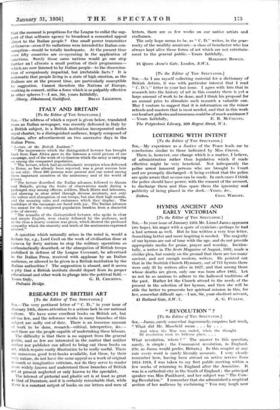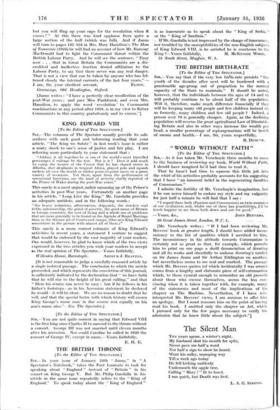" REVOLUTION " ?
[To the Editor of Tun SPECTATOR.]
SIR,—Janus, surely somewhat ingenuously, enquires last week,
`,1 What did Mr. Masefield mean . . . by . .
And when the War was ended, when the thought ' Of revolution took its hideous place. . . .
What revolution, where ? " The answer to this question, surely, is simple ; the Communist revolution, in England. (Or, as Janus would prefer, Britain.) In this couplet at any rate every word is surely literally accurate. I very clearly remember how, having been abroad on active Service from 1914-1918, I was taken to my first public meeting within a few weeks of returning to England after the Armistice. It was in a cathedral city in the South of England ; the principal speaker was Miss Pankhurst, and her subject was " The Com- ing Revolution." I remember that she admonished a sceptical section of her audience by exclaiming " You may laugh now
but you will fling up your caps for the revolution when it comes 1" At this there was loud applause from quite a large section of the hall (which was full). And if Janus will turn to pages 125-134 in Mrs. Mary Hamilton's The Man of Tomorrow (1924) he will find an account of how Mr. Ramsay MacDonald had to fight the Communist threat within the British Labour Party. And he will see the sentence, " Easy now . . . that in Great Britain the Communists are a dis- credited and ineffective fraction denied affiliation to the Labour Party, to say that there never was any real danger. That is not a view that can be taken by anyone who has fol- lowed closely the internal currents of the last four years."—
I am, Sir, your obedient servant, Evros. Greenways, Old Headington, Oxford.
[Janus writes : " I have a perfectly clear recollection of the post-War years ; and pace Miss Pankhurst, and even Mrs. Hamilton, to apply the word ' revolution ' to Communist machinations at any period after 1918, is in my view to flatter Communists in this country gratuitously and to excess."]











































 Previous page
Previous page